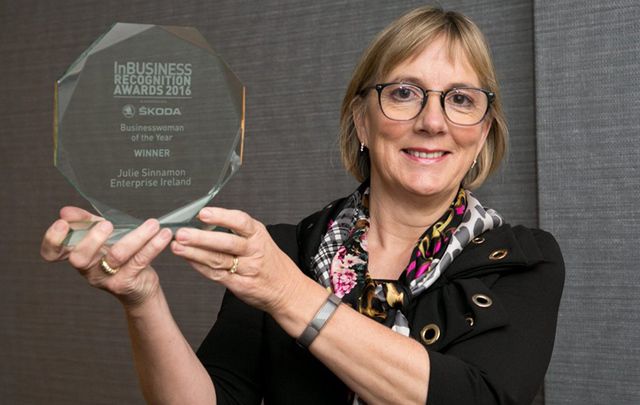Julie Sinnamon has been the CEO of Enterprise Ireland for over 3 years. She was the first woman to climb to the top position in the governmental agency supporting indigenous Irish companies. In this interview with Niamh Bushnell, Dublin Commissioner for Startups, Julie traces her career as a public servant, from attracting multinationals to Ireland to what grew into a passion for nurturing and supporting born and bred Irish companies.
Tell us about your journey with Enterprise Ireland and its different iterations.
I’m from County Down originally and studied at Ulster University. I came to Dublin to work on my thesis. One of the things that struck me about Dublin was the number of US multinational companies that were here. It was a contrast to the lean times for foreign direct investment (FDI) in Northern Ireland. I decided to do my thesis on FDIs and why they chose the Republic over Northern Ireland. I contacted the Industrial Development Authority (IDA) and worked with them on it. After I had graduated, I was working for Trinity Bank when one day someone from the IDA approached me to join them. I did it because of that interest I had in FDIs. Funnily, it was during my time there that I got more interested in the Irish indigenous companies. In 1994, IDA was split into an indigenous agency and an FDI agency. I was very keen to stay with the indigenous side and joined what first became Forbairt and then Enterprise Ireland.
What did you find while writing your thesis, why were companies choosing the Republic over Northern Ireland?
One of the things was tax. Another was talent. Northern Ireland was going through a tough time with the Troubles. Most people who looked at the Republic of Ireland never considered Northern Ireland. The risk was too high. The ones who did move to Northern Ireland found the risk acceptable. Tax and talent were big factors in 1981, just as they are today. Serendipity also played a role. There was always a family connection with Ireland. The quality of life was a big part of it as well. Many people think it’s one thing – the tax. It was not back then, and it is not now.
Tell us about your transformation, getting more interested in the indigenous side?
My family in the north had a business, and I was always actively interested in it. When I was in the IDA, I experienced a similar sensation each time I worked with entrepreneurs who were at a similar stage. They came to us with an idea, we worked with them, and saw them grow into trading international companies. It was fantastic. Nowadays, I travel on trade missions with Irish companies and see the belief their customers have in their products; I experience that same buzz. What people do not realise is that these founders are heroes starting their companies in towns and villages all around the country. People like John Power from Aerogen, a company that provides nebulisers for people in developing countries, and Dr. Nora Khaldi, the founder of Nuritas. She was recently awarded Woman of the Decade at the Women Economic Forum. One thing I am particularly proud of is that in 2016 we supported 63 female-led high-potential startups. In 2011, it was seven. Starting up seems a lot more viable for women when they see others doing it too.
Applications for the International #CSF fund are due in by 3pm today - win up to €50k to start up in Ireland https://t.co/TbnfLgyEnC pic.twitter.com/WeDwV8KmtQ
— Enterprise Ireland (@Entirl) March 22, 2017
Is that how you felt about building your career in EI? I guess there wasn’t a huge number of females at the top of the totem pole.
When I joined, my direct boss was female. She’s someone who has played a crucial role for me and is still a mentor. She has gone on to inspire lots of other females. But other than that there were no women divisional managers, directors, or a CEO: it certainly was a male dominated organisation.
Did you feel like you were breaking some kind of glass ceiling when you came up the ranks or did it feel natural?
I went for jobs that I wanted to do. I was doing them because I wanted them as opposed to thinking I want to do it because there should be more females doing it. I was quite oblivious to the gender issues early on. When I got the CEO job, it was the first time a woman had that role and it was a big deal. We’re more tuned into the subject today, and there still is a long way to go. But this is about more than just equality. To fix this country and maximise its potential, we need to use all the talent we’ve got.
Why did you want the CEO role?
In the ten years before I got it, I worked closely with Frank Ryan (the former CEO), so I had a good idea what the role involved. One of the questions I had going forward for it was whether I wanted it. That is typical for women and goes back to confidence. I thought, “Well, I spend so much time telling other women they should put their name forward, that I have to do it myself too.” Having the opportunity to work and influence the whole enterprise agenda for Irish companies was something which I thought was a great challenge. It has been a privilege to be able to do it.
What has surprised you about the role and what were some of the lessons that you’ve learned along the way?
Interestingly, the aspect of the role that I thought I wouldn’t enjoy, I’ve thoroughly enjoyed. That was the external piece. Going out and about, hearing and influencing people, and using every opportunity to move forward the agenda for EI’s clients. I was pushed outside of my comfort zone, which I believe is important. It’s how I discovered what I like, which was an important lesson.
Supported by Enterprise Ireland, Dawn Farms has announced plans to create 150 new jobs over the next five years https://t.co/AwjS5ZNJTk pic.twitter.com/PrFJ3wknrg
— Enterprise Ireland (@Entirl) February 24, 2017
You’ve been in the organisation for a couple of decades. What has changed and what excites you about what’s going on in the Irish industry?
The number of really successful entrepreneurs who started up, may have sold out, and have come back bigger and better, has grown. The confidence this cycle brings has also grown. It’s not about numbers; it’s about the growth in the ambition of the people who are coming through and the confidence that they can do it. We have a part to play by exposing Irish entrepreneurs to the best entrepreneurs in the world and helping them realise these are just normal people, with equal capabilities. We have made the journey a lot less scary by showing them that.
In my role as Commissioner, I’m always asking companies to wave the Irish flag. At the same time, I get that companies want to position themselves as global. What are your thoughts on taking ownership of the Irish identity?
I always say to our companies that people do not buy your products because you’re Irish and nice. People do like the Irish, and they like doing business with likable people. We travel very well. But people want solutions to their problems. It’s important that Irish companies not only have the innovation and the products that solve the problems but that they can also get the value proposition across to the customer. Why it is of relevance to them and why they need it. The pitch is key.
Which is your favorite EI program?
Leadership 4 Growth. I have seen its impact on ambition. People spend a few weeks together, nurturing a strong bond. All CEOs get lonely and having peers that they can talk to is incredible. The Leadership 4 Growth program has given people the skills to deliver on the ambition, and it has given them a sense of community. To me, there’s no other development agency globally who has a program like it. We can see a strong correlation between the leadership developing and the accelerated growth of the companies. Our International Selling Programme has helped people formulate their value proposition. Selling is not just about the gift of the gab; it is a science to maximise sales, establish a pipeline, and follow up on it to make sure that the interest translates into a contract.
Enterprise Ireland is becoming more known as an investor of international scale. Why is that important?
When we started investing capital in startups as opposed to giving grants, we did it on the basis that we’re taking risks with these companies, and should try to make some return. That grew, and we are currently the third biggest investor globally. We do about 230 deals a year. One of the things that we didn’t realise when we decided to take equity in companies was the benefit for the companies as they hit international markets. It was giving them a stamp: the Irish government is one of the shareholders in the company. That gave credibility to young startups.
.@Entirl is seeking 50 international researchers to work in Ireland's Technology Centres. Apply before March 31: https://t.co/yiaHPgzeC6 pic.twitter.com/A2R8oVk4kD
— Enterprise Ireland (@Entirl) February 14, 2017
A number of companies sing the praises of Enterprise Ireland for the R&D grants that you give. Is that a big part of what you do?
It’s a big part, and it should be bigger, especially at the current times. Many companies that have spent money on R&D and have highly innovative products have been able to command price increases as currencies have gone against them in the UK. Innovation is important, and R&D support can help companies spend more on innovation and be more innovative than they might otherwise be. One of the surprises to me is that companies don’t approach us as often to get the R&D grants. We recently looked at the correlation between companies that have withstood the downturns better. It’s those who have been supported with R&D.
What is the future of the indigenous economy?
We are getting to a critical mass in the early stage technology companies that we didn’t have ten years ago. One of the sectors where we could be really good is MedTech and Life Sciences, an area where we already have a cluster of strong companies, with great IP. We have a very active angel network investing in the space. The food sector is another. 55% of exports of Enterprise Ireland clients are in food. One in seven babies in China is fed with Irish milk formula. It is a phenomenal success that most people don’t even know about, and it’s because of the unique mix of green agriculture, the sustainability agenda, and excellent science. One of the real challenges for us is to get those stories out there. Another great success is Movidius – a great story and a great role model for ours to look at and take comfort from. It helps us realise that if we have a leading edge technology, we can extract great value from it as long as we hang in there and keep focused.
Tell us about the value EI brings to international people?
We’ve 32 offices around the world, so we have our antennae around the world and see what’s happening in the marketplace. Locally, we see what is going on at the end of research since we are heavily involved with Technology Centers in all the key sectors in Ireland. We connect the people with markets and technology, thus shortening the journey for anybody outside Ireland coming in and tapping into what we have going on. I often hear from people in other countries saying, “Why can’t we have an Enterprise Ireland for our country?” It confirms the value we bring.
---
This interview appears courtesy of the Dublin Globe. To read more stories from Dublin's start-up ecosystem, visit their website here.




Comments